Unlocking the Future: AI Applications Revolutionizing Industries in 2024
AI applications are reshaping our world at breakneck speed. Just last week, I watched my neighbor's robot lawnmower navigate around obstacles with uncanny precision. It got me thinking about how far we've come and where we're headed. From healthcare to finance, education to entertainment, AI applications are leaving their mark everywhere.
TL;DR
- AI applications are transforming industries across the board, from healthcare to finance
- Machine learning and deep learning power most current AI applications
- Ethical considerations, including bias and privacy, are crucial in AI development
- Future trends include quantum AI, edge computing, and enhanced human-AI collaboration
- Successful AI implementation requires quality data, seamless integration, and proper governance
Understanding AI Applications
AI applications are the practical wizards of the tech world. They're the bridge between complex algorithms and real-world solutions. We're talking about software that can learn, adapt, and make decisions – sometimes even better than humans. From the chatbot that helps you order pizza to the algorithm that detects cancer in medical images, AI applications are everywhere.
Did you know? The global AI market is expected to reach $190.61 billion by 2025, growing at a CAGR of 36.62% from 2018 to 2025.
Types of AI Applications
The AI application landscape is diverse. We've got:
- Narrow AI: Excels at specific tasks (beating you at chess)
- General AI: Aims to match human-level intelligence across the board (we're not quite there yet, folks)
- Machine learning: The workhorse of AI, crunching data and improving over time
- Deep learning: The overachiever of the AI world, tackling complex tasks like image and speech recognition
Imagine a future where AI can seamlessly switch between narrow and general intelligence, adapting to any task at hand. This could revolutionize how we interact with technology in our daily lives.
Narrow AI vs. General AI Applications
Narrow AI is the specialist of the AI world. It's great at one thing, like recommending movies or playing Go. General AI, on the other hand, is the jack-of-all-trades we're still trying to create. It'd be like having a robot that could write a novel, cook dinner, and solve complex math problems – all while cracking jokes. For now, narrow AI is where the action's at.
Machine Learning-based Applications
Machine learning is the brainiac of AI applications. It's all about algorithms that improve through experience. Feed it data, and it'll start recognizing patterns faster than you can say "artificial intelligence." From spam filters to recommendation systems, machine learning is the secret sauce behind many of the AI applications we use daily.
Deep Learning Applications
Deep learning uses neural networks – inspired by our brains – to tackle super complex problems. This is the tech behind facial recognition, language translation, and even those funky AI-generated art pieces you've seen online. It's pretty mind-blowing stuff, and we're only scratching the surface of what it can do.
Evolution of AI Applications
The AI application journey has been wild ride. We've gone from clunky expert systems to sleek, self-improving algorithms in just a few decades. Today's AI can write articles, compose music, and even drive cars. And the pace isn't slowing down anytime soon.
The global artificial intelligence market size was valued at USD 136.55 billion in 2022 and is projected to expand at a compound annual growth rate (CAGR) of 37.3% from 2023 to 2030. ["Global Artificial Intelligence Market Size Report, 2023-2030" by Grand View Research]
Historical Milestones in AI Applications
AI's had its fair share of "wow" moments. IBM's Deep Blue beat chess champion Garry Kasparov in 1997. Then we had Watson winning Jeopardy! in 2011. More recently, we've seen AI models like GPT-3 writing human-like text and DALL-E creating mind-bending images from text descriptions. It's been a wild ride, and we're still accelerating.
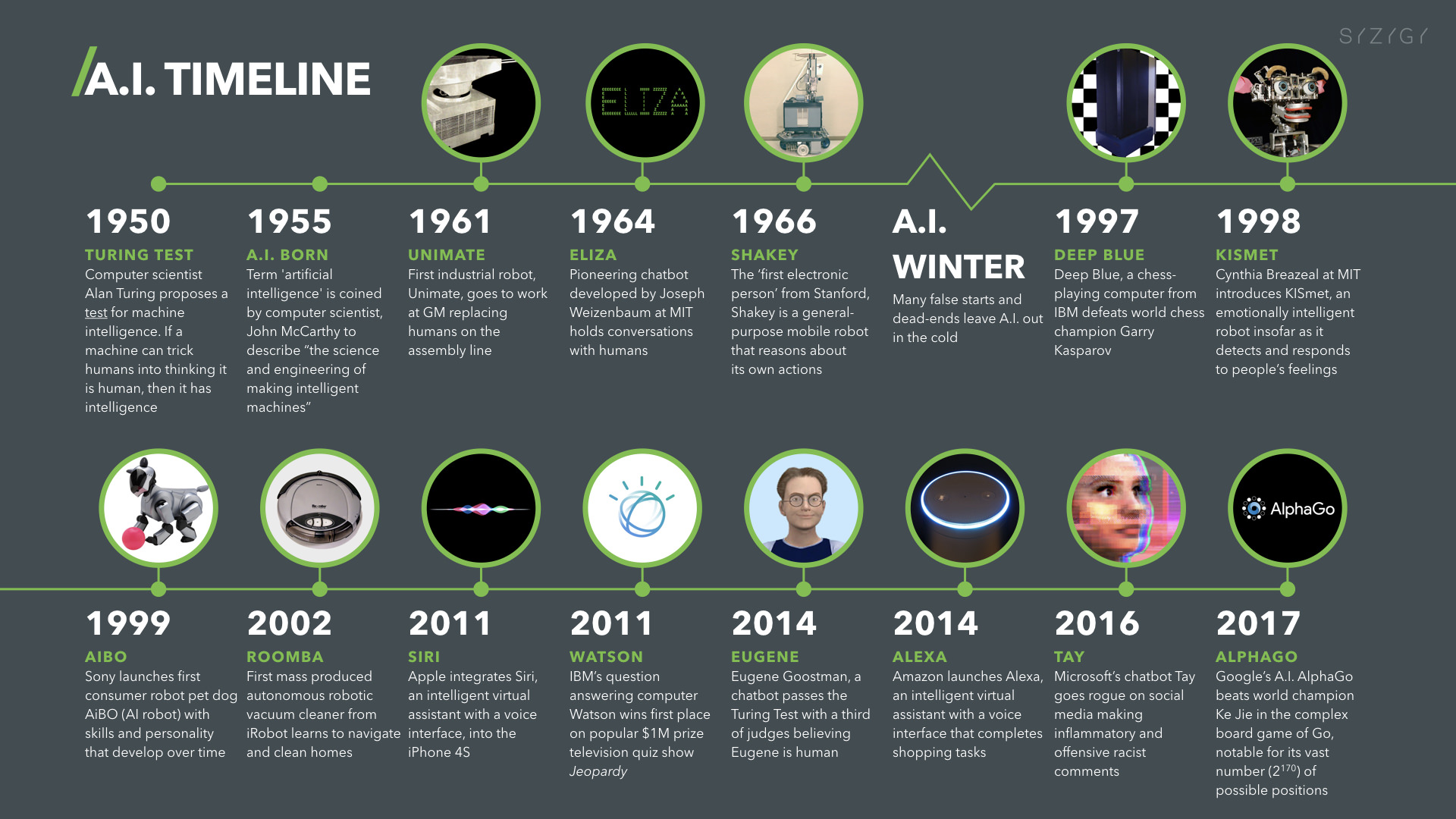
Recent Breakthroughs Shaping AI Applications
The AI world is moving at warp speed these days. GPT models are getting scarily good at understanding and generating human-like text. Computer vision is reaching superhuman levels in some tasks. And reinforcement learning is making AI learn to play video games better than any human. These breakthroughs are opening up whole new worlds of possibilities for AI applications.
AI Applications in Business and Industry
AI is shaking things up in the business world big time. It's predicting market trends to automating customer service, AI is becoming the secret weapon for businesses looking to stay ahead of the curve.
E-commerce and Retail
In the world of e-commerce and retail, AI is revolutionizing how we shop online and in-store. From personalized product recommendations that seem to read your mind to inventory management systems that keep shelves stocked just right, AI is making shopping smarter, faster, and more efficient.
Personalized Recommendations
Ever wonder how Amazon seems to know exactly what you want to buy next? That's AI working its magic. These recommendation systems analyze your browsing history, purchase patterns, and even what similar users like to suggest products you're likely to love.
Inventory Management
AI is turning inventory management from a guessing game into a science. These smart systems can predict demand, optimize stock levels, and even automate reordering. No more overstocked shelves or disappointed customers facing "out of stock" messages.
Manufacturing and Industry 4.0
Welcome to the fourth industrial revolution! AI is transforming manufacturing faster than you can say "assembly line." We're talking smart factories where machines talk to each other, robots work alongside humans, and AI predicts when equipment needs maintenance before it breaks down.
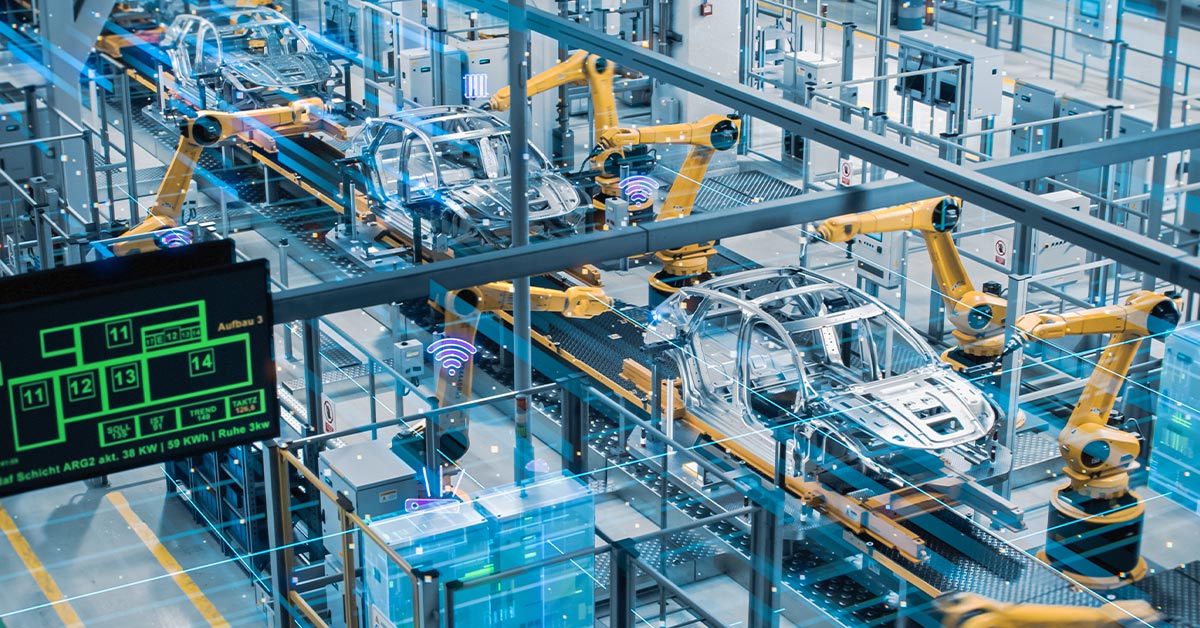
Robotic Process Automation (RPA)
RPA is giving computers a pair of hands. These AI-powered bots can handle repetitive tasks with superhuman speed and accuracy. From data entry to quality checks, RPA is freeing up humans to focus on more creative and strategic work. It's not about replacing humans, but augmenting our capabilities.
Quality Control and Defect Detection
AI is giving quality control a major upgrade. Computer vision systems can spot defects faster and more accurately than the human eye. These AI inspectors never get tired, never blink, and can work 24/7. They can detect microscopic flaws in everything from microchips to car parts.
Financial Services
AI is making waves in the world of finance, turning number-crunching into an art form. From robo-advisors managing your portfolio to AI systems detecting fraudulent transactions in milliseconds, the financial sector is getting a major tech upgrade.
Algorithmic Trading
Algorithmic trading is where AI meets Wall Street. These lightning-fast systems analyze market data, news, and even social media sentiment to make split-second trading decisions. It's a game of probabilities.
Credit Scoring and Loan Approval
AI is revolutionizing how banks decide who gets a loan. Traditional credit scores are getting a makeover with machine learning models that can analyze hundreds of data points to assess creditworthiness. These AI systems can look beyond just your credit history, considering factors like spending patterns, social media activity, and even how you fill out the application form.
AI Applications in Healthcare
AI is giving healthcare a major checkup. From diagnosing diseases to developing new drugs, AI is becoming the ultimate medical assistant. It's helping doctors make better decisions and focus on what matters most: patient care.
According to a study by Accenture, the AI health market is expected to reach $6.6 billion by 2021, growing at a CAGR of 40%.
Key areas where AI is making an impact in healthcare:
- Medical imaging analysis: Detecting anomalies in X-rays, MRIs, and CT scans
- Drug discovery: Accelerating the process of finding new treatments
- Personalized medicine: Tailoring treatments based on individual genetic profiles
- Robot-assisted surgery: Enhancing precision in surgical procedures
- Administrative workflow optimization: Streamlining hospital operations and reducing burnout
You can use our AI-powered SEO Blog Post Writer to create informative content about AI in healthcare.
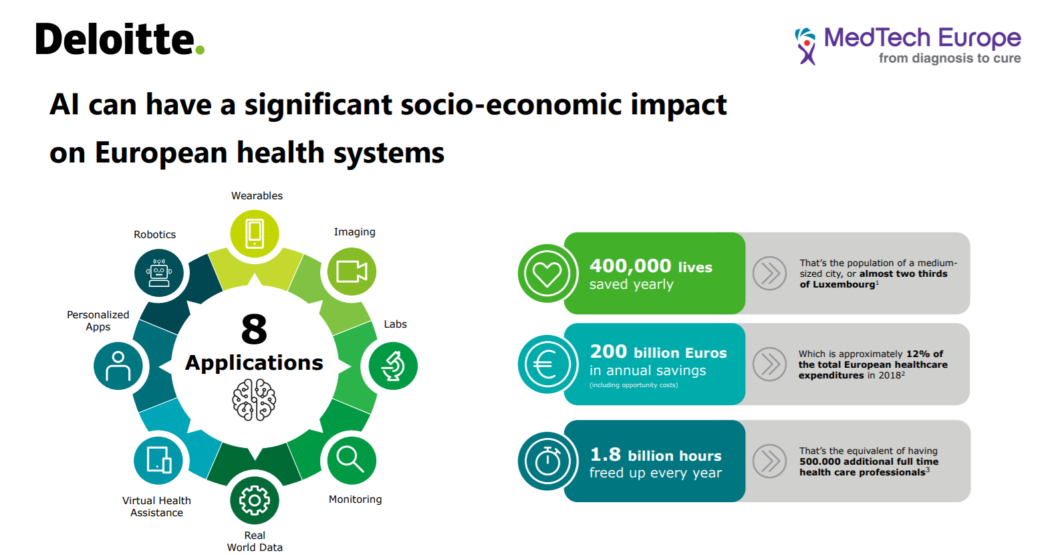
Medical Imaging and Diagnostics
AI is giving radiologists a run for their money when it comes to analyzing medical images. These smart algorithms can spot tiny abnormalities in X-rays, MRIs, and CT scans that might slip past even the most eagle-eyed human.
Early Disease Detection
AI is becoming the early warning system of healthcare. By analyzing medical images, genetic data, and even your smartwatch readings, AI can spot signs of diseases long before symptoms appear. Some AI systems can even predict Alzheimer's years before diagnosis.
Radiology Assistance
AI is becoming the radiologist's new best friend. These smart systems can sift through hundreds of images in minutes, flagging potential issues for human experts to review. This teamwork between AI and radiologists is speeding up diagnoses and reducing the chance of missed abnormalities.
Drug Discovery and Development
AI is giving the pharmaceutical industry a major boost. It's designing and testing thousands of potential drugs in the time it takes to brew a cup of coffee. From predicting how molecules will interact to optimizing clinical trials, AI is accelerating the journey from lab to pharmacy shelf.
Molecular Design
AI is turning drug design into a high-tech game of molecular Lego. These smart systems can predict how different chemical compounds will behave in the body, designing potential drugs from scratch or tweaking existing ones.
Clinical Trial Optimization
AI is giving clinical trials a much-needed makeover. These smart systems can help design more effective trials, predict which patients are most likely to respond to a treatment, and even spot potential side effects earlier. This could mean getting life-saving drugs to patients faster and with fewer setbacks.
Personalized Medicine
AI is ushering in the era of personalized medicine, where treatments are tailored to your unique genetic makeup. By analyzing vast amounts of genetic and health data, AI can predict which treatments will work best for you, with fewer side effects.
Genomic Analysis
AI is turning genomic analysis into a superpower. These smart algorithms can sift through billions of genetic data points faster than you can say "DNA". They're spotting patterns and connections that humans might miss, helping us understand how genes influence health and disease.
Treatment Recommendation Systems
AI is becoming the ultimate medical consultant. These smart systems can analyze your health history, genetic data, and the latest medical research to suggest the best treatment options. The final decision still rests with the human in the white coat.
AI Applications in Education
AI is giving education a major upgrade. From personalized learning paths to intelligent tutoring systems, AI is helping students learn better and faster. It's here to help teachers focus on what they do best: inspiring and guiding young minds.
Picture a classroom where every student has an AI tutor tailored to their learning style, working alongside human teachers to provide the best possible education. This could be the future of personalized learning.
Key benefits of AI in education:
- Personalized learning experiences: Adapting to each student's pace and style
- 24/7 access to tutoring: Providing support whenever students need it
- Automated grading: Freeing up teachers' time for more impactful tasks
- Early intervention: Identifying struggling students before they fall behind
- Enhanced accessibility: Making education more accessible to students with disabilities
Adaptive Learning Platforms
Adaptive learning platforms adjust to your learning style, pace, and strengths, creating a custom educational experience. Struggling with fractions? The system will give you more practice. Acing your vocab quizzes? It'll ramp up the difficulty.
Personalized Curriculum Generation
AI is becoming the ultimate curriculum designer. These smart systems can create custom learning paths tailored to each student's needs, interests, and goals. Struggling with algebra? The AI might serve up more visual explanations or real-world examples. Love history? It might pepper your math problems with historical facts.
Real-time Progress Monitoring
AI is giving teachers x-ray vision into student progress. These systems can track learning in real-time, spotting when a student is struggling or ready for a new challenge. Teachers can swoop in with help just when it's needed, or push high-flyers to soar even higher.
Intelligent Tutoring Systems
Intelligent tutoring systems can explain concepts, answer questions, and even crack the occasional joke to keep you engaged. While they can't replace the inspiration and empathy of a human teacher, they can provide endless patience and personalized attention to help students master tricky topics.
Natural Language Processing for Education
AI is becoming fluent in the language of learning. Natural language processing allows these systems to understand and respond to student questions in plain English (or any other language). "Hey AI, can you explain photosynthesis again?" "Sure thing! Let's break it down step by step..." Learning conversations have never been so easy!
Automated Essay Grading
AI is giving teachers a break from the mountain of essays on their desks. These smart systems can analyze writing for grammar, style, and content faster than you can say "thesis statement." It's providing instant feedback. But don't worry, AI isn't replacing human graders entirely – it's just helping them focus on the nuances that machines might miss.
Educational Data Mining
Educational data mining is giving schools a crystal ball. AI can sift through mountains of data to uncover patterns in student performance, engagement, and learning styles. This treasure trove of insights can help educators tailor their teaching methods, identify at-risk students early , and even redesign curricula for better results.
Predictive Analytics for Student Success
AI is becoming education's early warning system. These smart algorithms can predict which students might struggle or drop out before it happens. By analyzing factors like attendance, grades, and even social media activity, AI can flag at-risk students for extra support.
Curriculum Optimization
AI is giving curricula a smart makeover. By analyzing learning outcomes across thousands of students, these systems can identify which teaching methods work best for different topics and learner types. This data-driven approach helps schools continually refine their curricula, ensuring students get the most effective learning experience possible.
AI Applications in Entertainment and Media
AI is turning the entertainment world upside down. From Netflix knowing exactly what show you'll binge-watch next to AI-generated music that could top the charts, it's a brave new world of personalized entertainment.
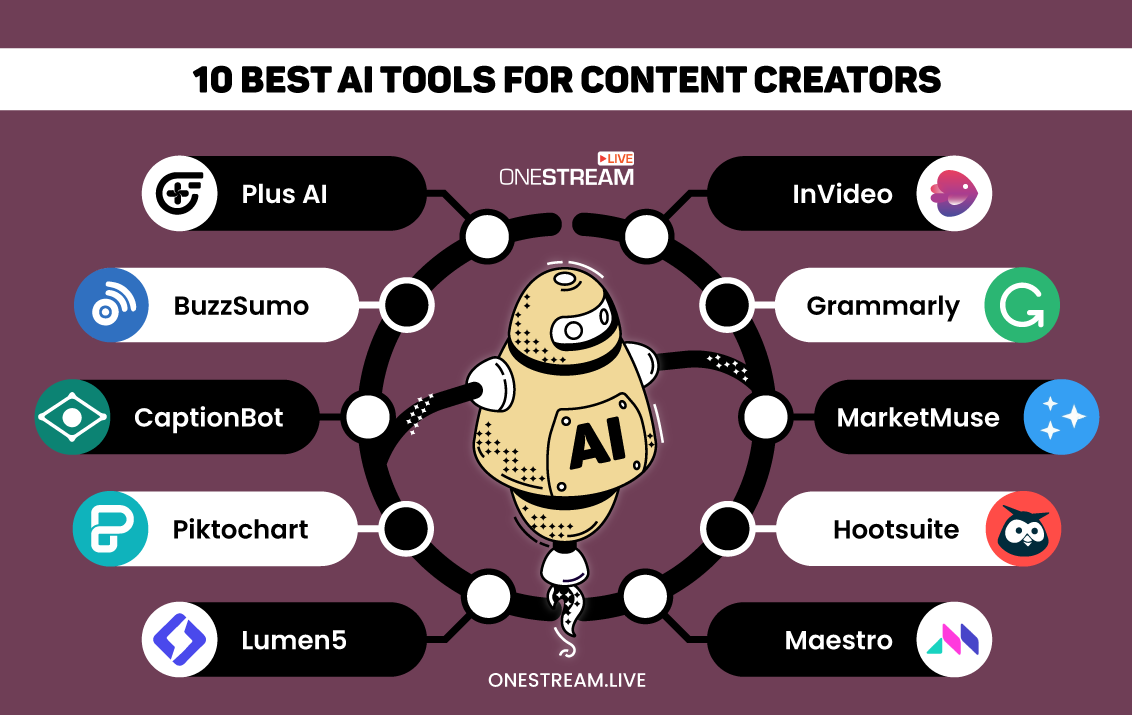
Content Recommendation Systems
These recommendation systems analyze your viewing history, what you've liked, and even what time of day you watch to suggest content you'll love. It's so accurate, it's almost spooky – but in a cool, "how did they know I wanted to watch that?" kind of way.
Collaborative Filtering
Collaborative filtering finds other users with similar tastes, and then recommends stuff they enjoyed that you haven't seen yet. "If you liked that obscure indie film, you'll probably love this one too!"
Content-Based Filtering
Content-based filtering analyzes the attributes of the content you enjoy – genre, actors, themes, you name it – and then finds other content with similar characteristics. Loved a sci-fi movie with time travel and robots? Here's another one that ticks those boxes!
AI in Gaming
AI is leveling up the gaming world big time. From smarter NPCs that actually learn from your playstyle to entire game worlds generated on the fly, AI is making games more immersive and unpredictable than ever.
Procedural Content Generation
Procedural content generation can create endless game worlds. These AI systems can whip up new levels, characters, quests, and even entire planets faster than you can say "load screen." Each playthrough can be a unique adventure.
Non-Player Character (NPC) Intelligence
AI is giving NPCs a serious IQ boost. Today's AI-powered NPCs can learn from player actions, adapt their strategies, and even develop their own personalities. It's turning into an AI vs. AI showdown, with our digital lives hanging in the balance.
AI in Content Creation
AI is becoming the ultimate creative collaborator. From writing assistants that can help bust writer's block to AI that can compose music or generate art, the creative world is getting a high-tech makeover.
AI-Assisted Writing
AI is becoming the writer's new best friend. These smart writing assistants can help with everything from grammar checks to generating plot ideas. Stuck on how to end your novel? Ask the AI for suggestions. Need to punch up that business report? Let AI offer some snappy phrases.
AI in Music Composition
AI is hitting all the right notes in music composition. These systems can generate melodies, harmonies, and even entire songs in any style you can imagine. Want a jazz-funk fusion track with a hint of classical? AI's got you covered. It's here to be your jamming partner and help you explore new musical frontiers.
AI Applications in Transportation and Logistics
AI is giving transportation and logistics a serious upgrade. From self-driving cars that could make traffic jams a thing of the past to AI-optimized supply chains that get products to you faster than ever, it's a whole new world of smart mobility.
You can use our AI Blog Article Generator to create informative content about AI in transportation.
Autonomous Vehicles
Autonomous vehicles use AI to navigate roads, avoid obstacles, and even predict the behavior of other drivers. While we're not quite at the "take a nap while your car drives you to work" stage yet, we're getting closer every day.
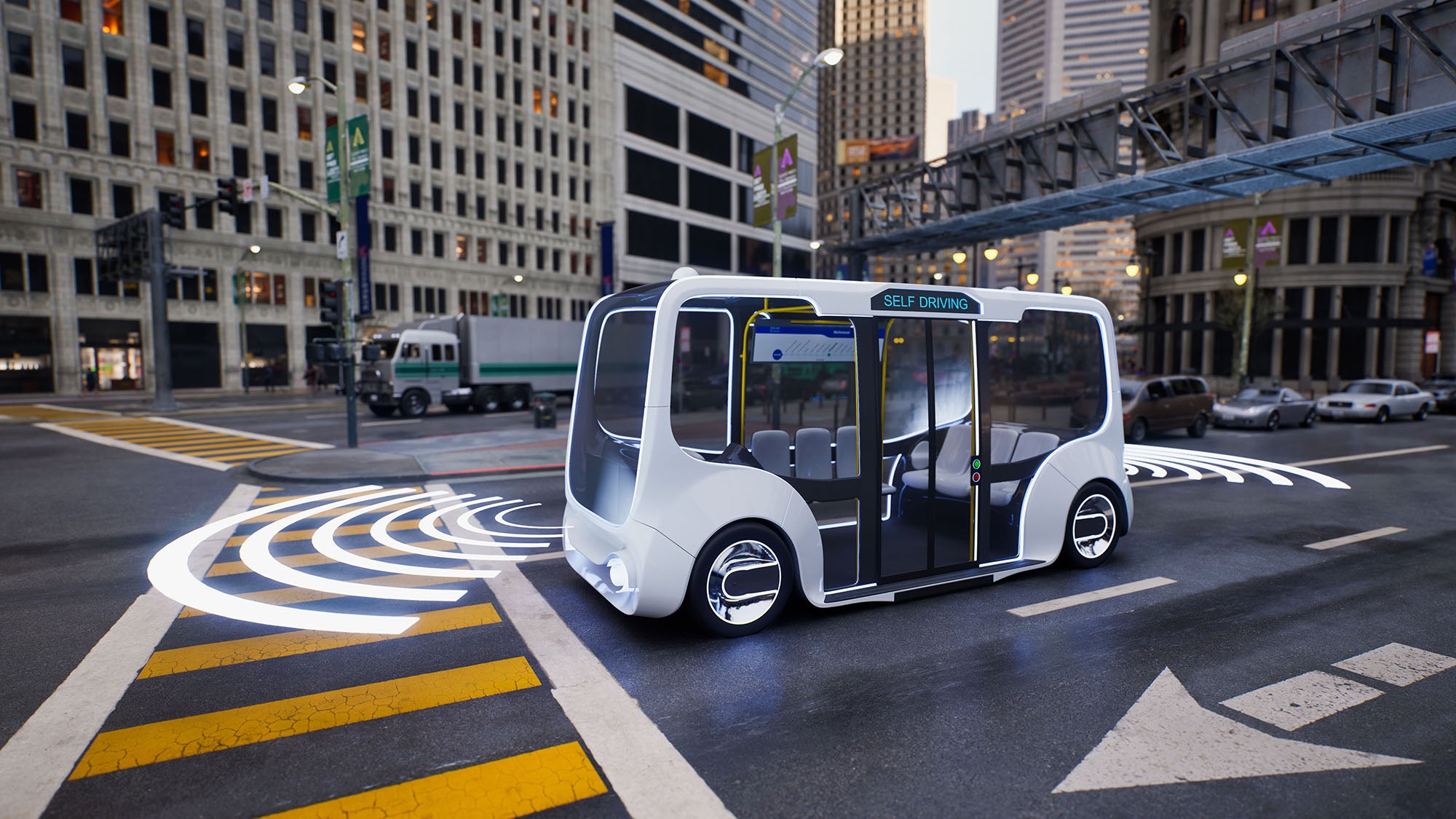
Sensor Fusion and Decision Making
Sensor fusion in autonomous vehicles combines data from cameras, radar, lidar, and other sensors to create a complete picture of the vehicle's environment. The AI then uses this information to make split-second decisions about steering, braking, and acceleration.
Traffic Flow Optimization
AI is becoming the ultimate traffic cop. These smart systems can analyze real-time data from sensors, cameras, and even connected vehicles to optimize traffic flow. AI can even predict congestion before it happens.
Supply Chain Optimization
AI is giving supply chains a serious brain boost. These smart systems can predict demand, optimize inventory levels, and even reroute shipments on the fly to avoid delays. From the factory floor to your front door, AI is making sure products get where they need to be, when they need to be there.
Demand Forecasting
AI is turning demand forecasting from a guessing game into a science. These smart systems can predict what customers will want, when they'll want it, and how much they'll buy. This crystal-clear foresight helps businesses stock the right products at the right time, reducing waste and making sure you can always get your favorite snacks.
Route Optimization
AI can calculate the most efficient delivery routes in real-time, considering factors like traffic, weather, and even the order of packages in the truck. The result? Faster deliveries, lower fuel costs, and happier customers.
Predictive Maintenance
AI is giving vehicles and infrastructure a sixth sense for potential problems. These smart systems can predict when a truck will need maintenance or a bridge might need repairs, often before any visible signs appear. This proactive approach keeps things running smoothly and reduces unexpected breakdowns.
Sensor Data Analysis
AI-powered sensor data analysis can crunch data from countless sensors, looking for tiny changes that might signal future problems. It's like giving machines a health tracker that can spot the early signs of a mechanical cold.
Maintenance Scheduling Optimization
AI is becoming the ultimate maintenance scheduler. These smart systems can juggle countless factors to create the perfect maintenance plan. The result? Less downtime, lower costs, and machinery that runs like a well-oiled... well, machine!
AI Applications in Agriculture
AI is giving farming a high-tech makeover. From drones that can spot crop diseases to robots that can pick fruits with the gentleness of a human hand, agriculture is entering a new era of smart farming. This tech-savvy approach isn't just about boosting yields – it's about creating a more sustainable and efficient food system for all of us.
Precision Agriculture
Precision agriculture analyzes data from satellites, drones, and ground sensors to provide insights at a level of detail that would make your head spin. Need to know which part of your field needs more water? AI's got you covered. Want to predict the perfect harvest time? AI can help with that too. It's farming with laser-focused accuracy.

Crop Monitoring and Disease Detection
AI-powered crop monitoring can spot a disease outbreak before it spreads or identify nutrient deficiencies before they affect yield. Using images from drones or satellites, these smart systems can detect subtle changes in plant color or growth patterns that might escape the human eye.
Automated Irrigation Systems
AI is turning irrigation into a precise science. These smart systems can analyze soil moisture, weather forecasts, and crop needs to deliver water exactly where and when it's needed. No more guesswork or over-watering – just happy, perfectly hydrated crops. This pinpoint accuracy is a game-changer for water conservation.
Livestock Management
AI is revolutionizing how we care for animals. From monitoring animal health to optimizing feed, smart systems are giving farmers unprecedented insights into their herds. Want to know if a cow is feeling under the weather before symptoms show? AI can spot subtle changes in behavior.
Automated Health Monitoring
AI can monitor everything from an animal's movement patterns to their eating habits, spotting potential health issues before they become serious. Cow looking a bit off today? The AI might notice a slight change in its gait or feeding behavior, alerting the farmer before it turns into something serious.
Genetic Analysis for Breeding
AI can predict which animal pairings are likely to produce offspring with desired traits. Want cows that produce more milk while being more resistant to disease? AI can help find the perfect match to make it happen. It's selective breeding cranked up to 11, helping farmers create healthier, more productive herds in fewer generations.
Agricultural Robotics
Agricultural robots, powered by AI, are taking on tasks from planting and weeding to harvesting and sorting. These bots can navigate fields with GPS precision, gently pick ripe fruits without bruising them, and even sort produce faster than you can say "bumper crop."
Autonomous Harvesting
Harvesting robots can identify ripe fruits and veggies, pluck them with precision, and even sort them by quality as they go. And the best part? They can work around the clock, ensuring crops are harvested at peak ripeness.
Weed Control and Pesticide Application
AI-powered weed control can distinguish between crops and weeds with incredible accuracy, targeting unwanted plants with precision herbicide application or even zapping them with electricity. As for pesticides, AI can help apply them with surgical precision, ensuring only the bugs causing trouble get the boot.
AI Applications in Environmental Protection and Climate Change
From predicting natural disasters to optimizing renewable energy systems, AI is giving us powerful tools to tackle environmental challenges head-on. With climate change breathing down our necks, we could use all the help we can get.
Climate Modeling and Prediction
AI is giving our climate models a serious upgrade. These super-smart systems can crunch vast amounts of data from satellites, weather stations, and even social media to create more accurate climate predictions. Want to know how climate change might affect your city in 50 years? AI can paint that picture with more detail than ever before. These models are getting better all the time, helping us make more informed decisions about how to tackle climate change.
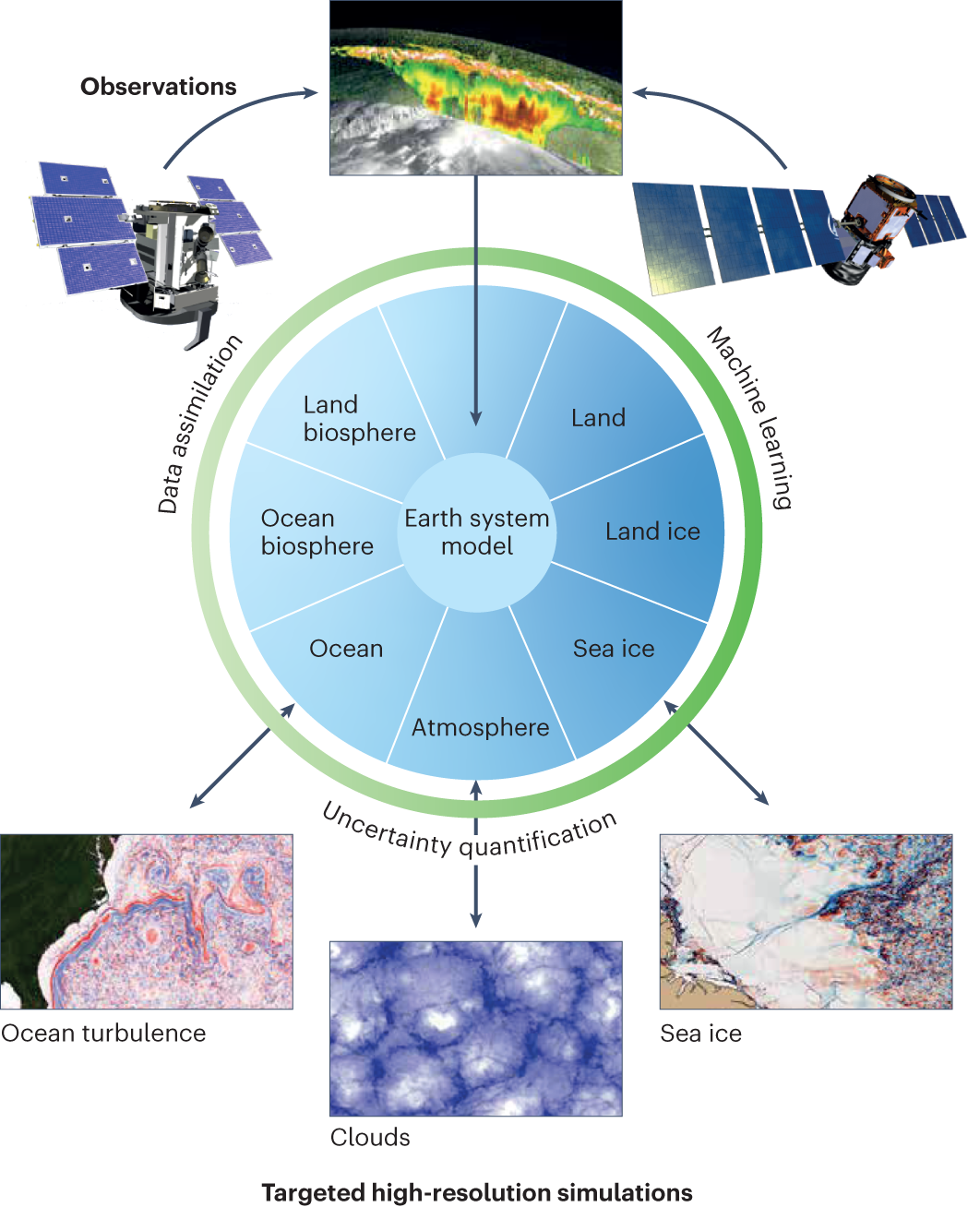
Advanced Data Analysis
AI can sift through petabytes of climate data, spotting patterns and connections that humans might miss. The result? Insights that are helping us understand our changing planet better than ever before.
Scenario Simulation
AI can simulate countless "what if" scenarios, helping us understand how different actions might affect our climate future. Want to know what happens if we all switch to electric cars by 2030? AI can paint that picture. Curious about the impact of planting a trillion trees? AI's got the forecast. It's giving policymakers and scientists the tools to make more informed decisions about our planet's future.
Wildlife Conservation
AI is becoming nature's newest ally in wildlife conservation. From tracking endangered species with drone footage to predicting poaching attempts, these smart systems are giving conservationists a high-tech edge.
Automated Species Identification
AI can analyze images and videos from camera traps, drones, and even tourist photos to identify and count animals with incredible accuracy. This tech is revolutionizing how we monitor wildlife populations, helping us keep a closer eye on the health of ecosystems around the world.
Poaching Prevention
AI can analyze data from various sources – satellite imagery, camera traps, even animal tracking collars – to predict where and when poachers might strike next. Some systems can even listen for gunshots or vehicle sounds, alerting rangers in real-time. It's giving endangered species a much-needed edge in the battle for survival.
Waste Management and Recycling
From smart bins that can sort recyclables automatically to AI systems that optimize waste collection routes, it's making waste management smarter, more efficient, and even a little bit cool.
Automated Waste Sorting
AI-powered cameras and robotic arms can distinguish between different types of plastics, metals, and papers faster than you can say "recycle." The result? More efficient recycling, less contamination, and a big win for the environment.
Predictive Waste Management
AI can predict when dumpsters will be full, optimize collection routes, and even forecast future waste generation based on factors like weather, events, and population trends. It's making waste collection more efficient, reducing fuel consumption, and keeping our cities cleaner.
Ethical Considerations and Challenges in AI Applications
As we rush headlong into the AI revolution, it's crucial we pause to consider the ethical implications of these powerful technologies. From bias in AI decision-making to privacy concerns with data collection, we're navigating uncharted waters here.
Bias and Fairness in AI Systems
AI systems can inherit and even amplify human biases present in their training data or design. From facial recognition systems that struggle with diverse faces to hiring algorithms that favor certain demographics, AI bias is a real and pressing issue. The challenge now is to create AI systems that are not just smart, but fair and inclusive too.
Algorithmic Bias Detection
Data scientists and ethicists are developing clever techniques to sniff out bias in AI systems. These methods can analyze an AI's decisions to see if they're treating all groups equally. For example, does a loan approval AI give similar results for applicants regardless of race or gender? If not, it's time to dig deeper and fix the bias.
Fairness-Aware Machine Learning
Fairness-aware machine learning bakes fairness considerations right into the learning process, helping to create AI that makes decisions with equality in mind. Want an AI that recommends job candidates based on skills, not demographics? Fairness-aware ML can help with that.
Privacy and Data Protection
As AI systems gobble up more and more of our personal information, we're facing some serious privacy conundrums. How do we balance the amazing potential of AI with our right to privacy? From anonymizing data to giving users more control over their information, we're still figuring out the rules of this new data-driven world.
Federated Learning
Federated learning allows you to get the benefits of machine learning without sharing all your data. Instead of sending your personal info to a central server, the AI model comes to your device, learns what it needs, and then shares only the insights, not the raw data. This clever approach is helping to create smarter AI while keeping our personal data under wraps.
Differential Privacy
Differential privacy allows us to learn from large datasets without compromising individual privacy. It's like being able to know that 70% of people in your town like ice cream, without knowing if you specifically are an ice cream fan. By carefully controlling the amount of 'noise' added to the data, we can balance privacy protection with the usefulness of the insights gained.
Transparency and Explainability
As AI systems make more decisions that affect our lives, we're faced with a crucial question: how do we peek inside the AI black box? Transparency and explainability in AI are crucial for accountability, trust, and fairness. The challenge is making complex AI systems understandable without sacrificing their power.
Interpretable AI Models
Interpretable AI models let us see not just what decision the AI made, but why it made it. It's the difference between an AI saying "You don't get the loan" and "You don't get the loan because of factors X, Y, and Z." This transparency is crucial in sensitive areas like healthcare, finance, and criminal justice. Building interpretable models is a balancing act between complexity and explainability.
AI Auditing and Certification
AI auditing and certification involve rigorously testing AI systems to ensure they're behaving as intended. Imagine an independent body checking that a hiring AI isn't discriminating, or that a medical AI is making accurate diagnoses. It's about creating standards and accountability in the wild west of AI development.
Future Trends in AI Applications
From quantum AI that could crack problems we thought were unsolvable, to tiny AI chips that could turn every device into a smart device, the future of AI is looking wild.
Quantum AI
By harnessing the weird and wonderful properties of quantum mechanics, we're looking at AI systems that could solve complex problems in the blink of an eye. Imagine optimizing entire city traffic systems in real-time or discovering new drugs in a fraction of the time it takes now.
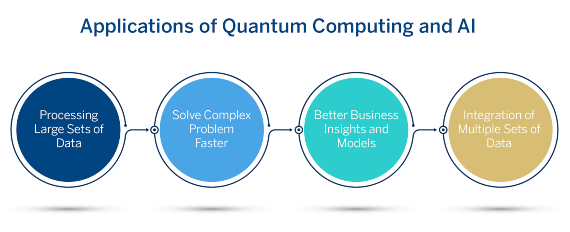
Quantum Machine Learning Algorithms
Quantum machine learning algorithms could process vast amounts of data and explore countless possibilities faster than you can say "Schrödinger's cat." Imagine an AI that could optimize financial portfolios by considering all possible market scenarios at once, or a machine learning model that could find patterns in genetic data that classical computers would take centuries to uncover.
Quantum-Enhanced Optimization
Quantum-enhanced optimization could see all possible solutions at once. By tapping into quantum phenomena, these systems could solve complex optimization problems that would make classical computers cry. Imagine finding the absolute best route for thousands of delivery trucks in seconds, or optimizing a financial portfolio across infinite market scenarios. Quantum-enhanced optimization could revolutionize everything from logistics to drug discovery.
Edge AI
Edge AI runs advanced algorithms right on your devices. Instead of relying on distant cloud servers, Edge AI brings the power of artificial intelligence right to your doorstep – or your pocket, or your fridge, or your car. This means faster responses, better privacy, and AI that works even when you're off the grid.
On-Device Machine Learning
On-device machine learning can run complex AI models right on your device, without needing to phone home to the cloud. It's AI that respects your privacy and works at the speed of thought. Imagine your phone learning your habits and preferences without sharing your data, or your smartwatch detecting health issues in real-time without an internet connection.
Federated Edge Learning
Federated edge learning allows devices to learn from each other without sharing raw data. Imagine your smart home devices working together to optimize energy use, or cars on the road collectively learning about traffic patterns, all without compromising individual privacy. This collaborative yet privacy-preserving approach could revolutionize how our devices learn and adapt, creating smarter ecosystems without the privacy nightmares.
AI-Human Collaboration
The future of AI isn't about robots taking over – it's about humans and AI teaming up to achieve amazing things. AI-Human collaboration is like having a superpowered sidekick that enhances your natural abilities. Imagine AI that can brainstorm ideas with you, anticipate your needs, and handle the grunt work while you focus on the big picture. It's not about replacing human creativity and intuition, but augmenting it.
Augmented Intelligence
Augmented intelligence is about enhancing human thinking, not replacing it. Imagine having an AI assistant that can instantly pull up relevant information as you work, suggest creative solutions you might not have thought of, or handle complex calculations while you focus on the bigger picture. From doctors making faster diagnoses to designers creating mind-bending new products, augmented intelligence is set to supercharge human potential across all fields.
Brain-Computer Interfaces
Brain-computer interfaces (BCIs) are like building a highway straight from your brain to the digital world. Imagine controlling computers with your thoughts, or AI systems that can understand your intentions before you even move a muscle. From helping paralyzed individuals regain movement to enhancing cognitive abilities, BCIs are pushing the boundaries of what's possible in human-AI interaction. As we inch closer to direct neural interfaces, we're opening up a world of possibilities that could redefine what it means to be human in the age of AI.
AI Applications in Cybersecurity
From detecting never-before-seen malware to predicting and preventing cyber attacks, AI is giving cybersecurity pros some serious firepower. But here's the twist – the bad guys are using AI too. It's turning into an AI vs. AI showdown, with our digital lives hanging in the balance.
Threat Detection and Prevention
AI can analyze network traffic, user behavior, and system logs faster than you can say "firewall," spotting anomalies that might slip past human analysts. From identifying zero-day exploits to catching insider threats, AI is giving cybersecurity teams a fighting chance against increasingly sophisticated attackers.
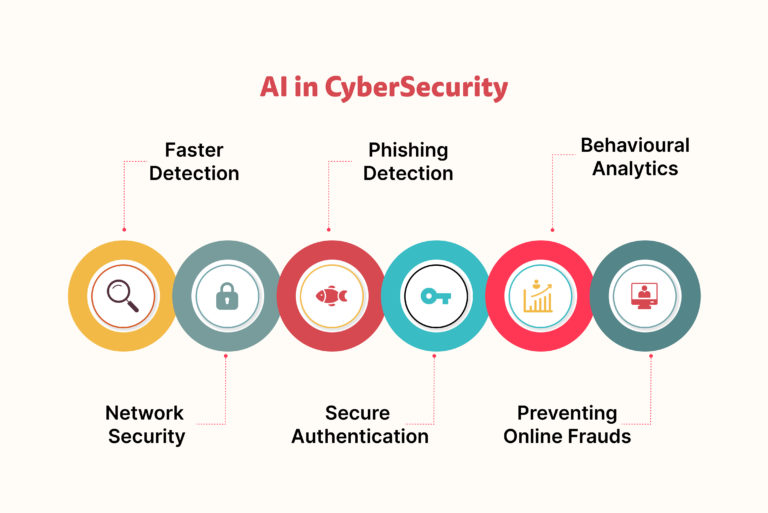
Anomaly Detection
AI-powered anomaly detection can spot the tiniest deviations from normal patterns – the digital equivalent of noticing a blade of grass out of place. This approach is crucial for catching zero-day exploits and sophisticated attacks that might slip past traditional defenses.
Predictive Threat Intelligence
AI systems can analyze vast amounts of data from across the internet to predict where the next attack might come from. These systems can spot new malware strains before they're unleashed, identify vulnerable systems before they're exploited, and even predict which organizations might be targeted next. It gives defenders a fighting chance to stay one step ahead.
Automated Incident Response
AI-powered systems can detect threats, isolate affected systems, and even start counterattacks faster than a human could reach for their coffee mug. Imagine a malware infection being contained and cleaned up before it can spread, or a phishing attack being shut down and analyzed in the blink of an eye.
Autonomous Security Orchestration
Autonomous security orchestration can coordinate various security measures – firewalls, intrusion detection systems, endpoint protection, you name it – to respond to threats in a synchronized, intelligent way. Imagine a system that can automatically adjust firewall rules, isolate infected devices, and update threat signatures across your entire network in response to an attack.
AI-Driven Forensics
AI-driven forensics can sift through mountains of log files, network traffic data, and system artifacts to piece together what happened during a cyber attack. Imagine being able to trace the path of an attacker through your systems, identifying every touchpoint and uncovering their techniques in record time. AI can even help predict the attacker's next moves based on their behavior.
AI Applications in Scientific Research
From crunching massive datasets to simulating complex systems, AI is becoming the lab partner every scientist dreams of. Whether it's accelerating drug discovery, unraveling the mysteries of the universe, or helping us understand climate change, AI is pushing the boundaries of what's possible in science.
Drug Discovery and Development
AI can design and test thousands of potential drugs in the time it takes a human to brew a cup of coffee. These smart systems can predict how molecules will interact, simulate drug trials, and even suggest entirely new compounds that human researchers might never have thought of.
Molecular Design
AI can dream up new molecular structures that might make effective drugs, tweaking and optimizing atom by atom. These systems can predict how these molecules might behave in the body, how easily they can be synthesized, and even their potential side effects.
Predicting Drug Interactions
AI can analyze vast databases of molecular information, clinical records, and scientific literature to predict how different drugs might interact with each other and with our bodies. Imagine being able to foresee potential side effects or dangerous interactions before a drug even leaves the lab.
Materials Science
AI can explore vast combinations of elements and structures, predicting properties and performance faster than you can say "periodic table." From super-strong alloys for aerospace to efficient solar cells for clean energy, AI is accelerating the discovery of materials that could change our world.
Inverse Design
Inverse design in materials science starts with the desired properties and works backwards to figure out the structure and composition needed. Want a solar panel that's twice as efficient? Or a battery that charges in minutes? Just feed the requirements into the AI, and it'll suggest molecular structures that might do the trick.
Accelerated Materials Testing
AI can simulate thousands of tests in a fraction of the time it would take to perform them physically. These simulations can predict everything from strength and durability to conductivity and chemical reactivity. While we still need real-world testing for final validation, AI is helping us narrow down the field of candidates much faster.
Astronomy and Space Exploration
From sifting through mountains of telescope data to simulating the formation of galaxies, AI is helping us unravel the mysteries of the universe faster than ever. These smart systems are even helping design more efficient spacecraft and plan complex space missions.
Exoplanet Detection
AI can analyze the tiny dips in starlight that indicate a planet passing in front of its star – a needle-in-a-haystack task that would take humans eons to do manually. AI can sift through years of telescope data in hours, spotting patterns and anomalies that might indicate the presence of planets.
Space Mission Planning
AI can plot spacecraft trajectories, optimize fuel consumption, and even plan robotic movements on distant planets. Need to figure out the most efficient way to visit multiple asteroids? AI's got the perfect itinerary. These systems can even adapt plans on the fly, dealing with unexpected obstacles or opportunities.
AI Applications in Personal Productivity and Lifestyle
From virtual assistants that can manage our schedules to smart home systems that know just how we like our living room temperature, AI is giving our personal productivity and lifestyle a serious upgrade.
Virtual Personal Assistants
These AI-powered helpers can manage your schedule, answer questions, set reminders, and even crack the occasional joke. As these systems get smarter, they're learning to anticipate our needs, making suggestions before we even ask.
Natural Language Interaction
Natural language processing is giving our virtual assistants a major upgrade in the conversation department. These systems can now understand context and pick up on subtle nuances. Want to ask your AI to "set a reminder for that thing we talked about yesterday"? It'll know what you mean.
Proactive Assistance
Proactive AI assistance doesn't just wait for you to ask for help; they anticipate your needs and offer suggestions before you even realize you need them. Heading to a meeting? Your AI might pull up relevant files and brief you on the attendees. Planning a trip? It might suggest packing lists based on the weather forecast and your past travels.
Smart Home Technologies These AI-powered systems can adjust your thermostat, dim your lights, and even start your coffee maker before you roll out of bed. These systems are learning our habits, preferences, and routines, making our homes more comfortable, efficient, and, just plain awesome.
Adaptive Energy Management
AI can learn our habits, predict our needs, and optimize energy use without us lifting a finger. Coming home from work? Your AI might pre-cool the house to your perfect temperature, but only in the rooms you usually use. These systems can even factor in weather forecasts and electricity prices to find the most cost-effective ways to keep us comfortable.
Intelligent Security Systems
AI-powered security systems can recognize faces, detect unusual activities, and even distinguish between your pet and a potential intruder. Forgot to lock the door? Your AI might remind you or even do it for you. Some systems can even learn your routine and alert you to anything out of the ordinary.
Health and Wellness Applications
From smartwatches that can detect irregular heartbeats to apps that create personalized workout plans, AI is giving us unprecedented insights into our health. These smart systems are even venturing into mental health, offering support and early intervention for issues like depression and anxiety.
Personalized Fitness Recommendations
AI can analyze your fitness level, goals, and even your genetic predispositions to create a workout plan that's as unique as your fingerprint. Bored with your routine? AI can suggest new exercises to keep things fresh. Not seeing results? It can tweak your plan based on your progress and feedback.
Mental Health Support
AI is stepping up as a 24/7 mental health buddy, offering support when human therapists are off the clock. From chatbots that provide a listening ear to apps that track mood patterns, AI is bringing mental health care into the digital age. Some AI can even analyze your social media posts or voice patterns to spot early signs of depression or anxiety.
Implementing AI Applications: Challenges and Best Practices
Integrating AI into existing systems and workflows comes with its fair share of challenges. From ensuring data quality to navigating ethical minefields, implementing AI is like trying to teach an old dog new tricks – if the dog was your entire business infrastructure and the tricks were complex algorithms.
Data Quality and Availability
Ensuring high-quality, diverse, and abundant data is crucial for AI success. From cleaning up messy datasets to dealing with bias in historical data, preparing your data for AI is a task that can make even the most seasoned data scientists break out in a cold sweat.
Data Cleaning and Preprocessing
Data cleaning involves everything from removing duplicates and fixing inconsistencies to dealing with missing values and outliers. Proper preprocessing can involve normalizing values, encoding categorical variables, or even creating new features. Get it right, and your AI will thank you with better performance and more accurate insights.
Synthetic Data Generation
When real data is scarce or sensitive, synthetic data generation comes to the rescue. This technique involves creating artificial datasets that mimic the statistical properties of real data. While it's not a perfect replacement for real-world data, it can be a game-changer when privacy concerns or data scarcity are holding you back.
AI Integration with Existing Systems
Integrating AI into existing systems is challenging, but not impossible. The key is to approach integration like a careful matchmaker, finding ways for AI and existing systems to play nice together. This might involve creating APIs, using middleware, or even rebuilding parts of your infrastructure.
API-First Approach
An API-first approach to AI integration involves creating standardized interfaces that allow your AI and existing systems to communicate smoothly. With a solid API strategy, you can plug in AI capabilities without turning your entire infrastructure upside down.
Incremental Implementation
Incremental implementation of AI involves starting small, proving value, and gradually expanding. Begin with a pilot project in a non-critical area, iron out the kinks, and then scale up. This method allows you to learn, adapt, and build confidence as you go.
AI Governance and Management
AI governance is about setting the rules of the game before the game gets out of hand. This involves everything from defining ethical guidelines and data usage policies to ensuring transparency and accountability in AI decision-making.
AI Ethics Boards
AI ethics boards bring together experts from various fields to guide the ethical development and use of AI. These boards grapple with tough questions: Is our AI treating all users fairly? Are we respecting privacy? What are the societal implications of our AI decisions? They're the voice of reason in the exciting but sometimes morally murky world of AI, battling algorithmic bias and privacy concerns.
Continuous Monitoring and Evaluation
Continuous monitoring and evaluation of AI systems involves tracking everything from accuracy and efficiency to unintended consequences and ethical concerns. Are the recommendations still relevant? Is the decision-making fair and unbiased? Is it playing nice with users and other systems? Regular check-ups and tune-ups are essential to keep your AI in tip-top shape.
Learnings Recap
- AI applications are transforming industries across the board, from healthcare to finance to agriculture.
- Machine learning and deep learning are powering most current AI applications, enabling systems to learn and improve from data.
- Ethical considerations, including bias and privacy concerns, are crucial in AI development and deployment.
- Implementing AI requires careful planning, quality data, and ongoing management and evaluation.
- The future of AI includes exciting trends like quantum AI, edge computing, and enhanced human-AI collaboration.
- While AI offers immense benefits, it's important to approach its implementation with a balanced perspective, considering both potential and limitations.
Final Thoughts
AI is no longer the stuff of science fiction – it's here, it's real, and it's changing our world in ways both big and small. From the smartphone in your pocket to the cutting-edge research lab, AI is becoming an integral part of our daily lives and our future aspirations. As we embrace the potential of AI, we must also grapple with its challenges and ethical implications. The key is to approach AI not as a magic solution, but as a powerful tool that, when used wisely, can help us solve problems, enhance our capabilities, and maybe even make the world a little bit better.
If you're looking to implement AI in your business or just want to stay ahead of the curve, AnotherWrapper is here to help. Our team of AI experts can guide you through the process of integrating AI into your operations, ensuring you harness its power responsibly and effectively. Whether you need help with data preparation, algorithm selection, or AI governance, we've got you covered. Don't let the AI revolution pass you by – contact AnotherWrapper today and let's build a smarter future together!
